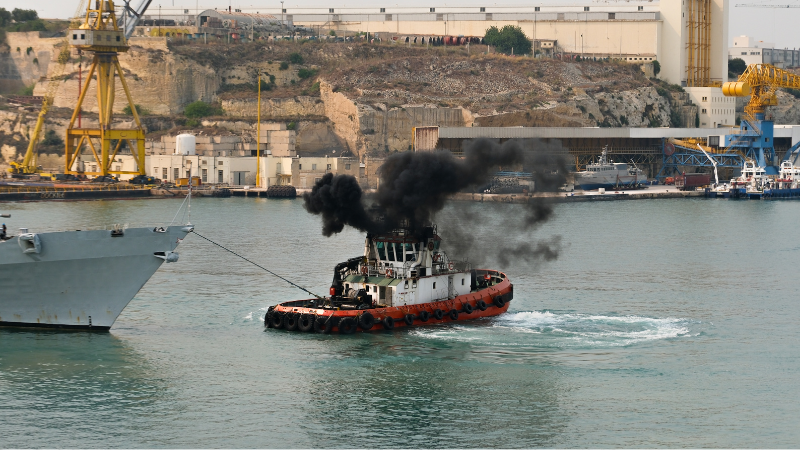BirdLife Malta is calling on the government to support the establishment of a Nitrogen Emission Control Area in the Mediterranean and suggests Malta could play an important role in such an initiative given the fact that it has one of the largest shipping registries in the region.
The call to action was made this morning at a press conference in Senglea during which the results of various air pollution measurements taken around the Grand Harbour this week were given.
Air quality expert Dr Axel Friedrich explained that while daily average pollution concentrations were within the limits suggested by EU legislation, particular peaks in exposure directly related to transiting ships are still detrimental to human health.
They are especially hazardous to residents within areas downwind of shipping activity, with Concentrations up to 120 micrograms/m3 being recorded Friedrich when ships were transiting – a dangerously high level compared to lows of 3 micrograms/m3 when there was no marine traffic.
The situation, according to BirdLife Malta and its German BirdLife partners Nature and Biodiversity Union, could improve with the establishment of a Nitrogen Emission Control Area (NECA) in the Mediterranean, which is one of the areas being currently studied for a proposal in the near future.

Air quality expert Dr Axel Friedrich (centre) speaking at this morning’s press conference. Photo: Murat Gelir.
The establishment of a NECA would also fall in line with ambitious revisions of the EU’s Ambient Air Quality Directive which are proposing lower safety thresholds for Nitrogen Dioxide concentrations for human health.
“Malta,” they said this morning, “needs to support such initiatives along with other EU Member States to safeguard air quality and ultimately our health and the environment in the near future.”
There are further measures that can be taken to ensure nitrogen emissions are reduced, such as through the use of after-treatment devices known as SCR catalysts. These devices use advanced technology to treat the emissions and are proven to reduce the harmful NOx emissions by more than 90%. More than 1,000 ships around the world use such control units successfully.
Addressing the press conference, BirdLife Malta Head of Conservation Nicholas Barbara said, “So far we have seen various measures taken with respect to improving air quality from shipping. The ship-to-shore power supplies expected to be completed in the coming months are one measure, along with the establishment of the SECA from 2025.
“Malta should however welcome and push for more initiatives such as NECA for the ultimate benefit of all.”
Nitrogen oxides are created in ships’ engines by the high temperatures in the combustion chamber and are released into the air with other gases such as carbon dioxide and particulate matter such as black carbon.
Nitrogen Dioxide is a highly reactive compound that damages human health and the environment and is considered to be a powerful greenhouse gas because it leads to the formation of harmful compounds such as ozone.
Such pollution is extremely harmful to human health. According to numerous studies, exposure to high NO2 concentrations diminishes the function of the lungs and increases the risk of cardiovascular disease. Recent studies prove that such air pollution significantly contributes to various health complications and even premature death.
Ports such as the Grand Harbour are typically inhabited by dense populations that are exposed to shipping emissions and, as such, bear the consequences associated with air pollution.
Exposure to pollutants would vary daily depending on climatic conditions such as wind strength and direction, and shipping activity such as the presence or traffic of cruise liners during high season summer months.
The International Maritime Organisation (IMO) last year announced the establishment of a Mediterranean Sulfur Emission Control Area (SECA) effective from 2025.
The move will affect shipping across the whole Mediterranean and is expected to improve air quality for millions of residents on the coasts of the Mediterranean, including Malta.
BirdLife Malta and its German BirdLife Partners Nature and Biodiversity Union, NABU (BirdLife Germany) are part of a Mediterranean-wide movement known as Together against Air Pollution from Ships which has been instrumental in raising awareness about air pollution from shipping and promoting solutions such as the use of cleaner fuel and the establishment of Emission Control Areas at sea.













